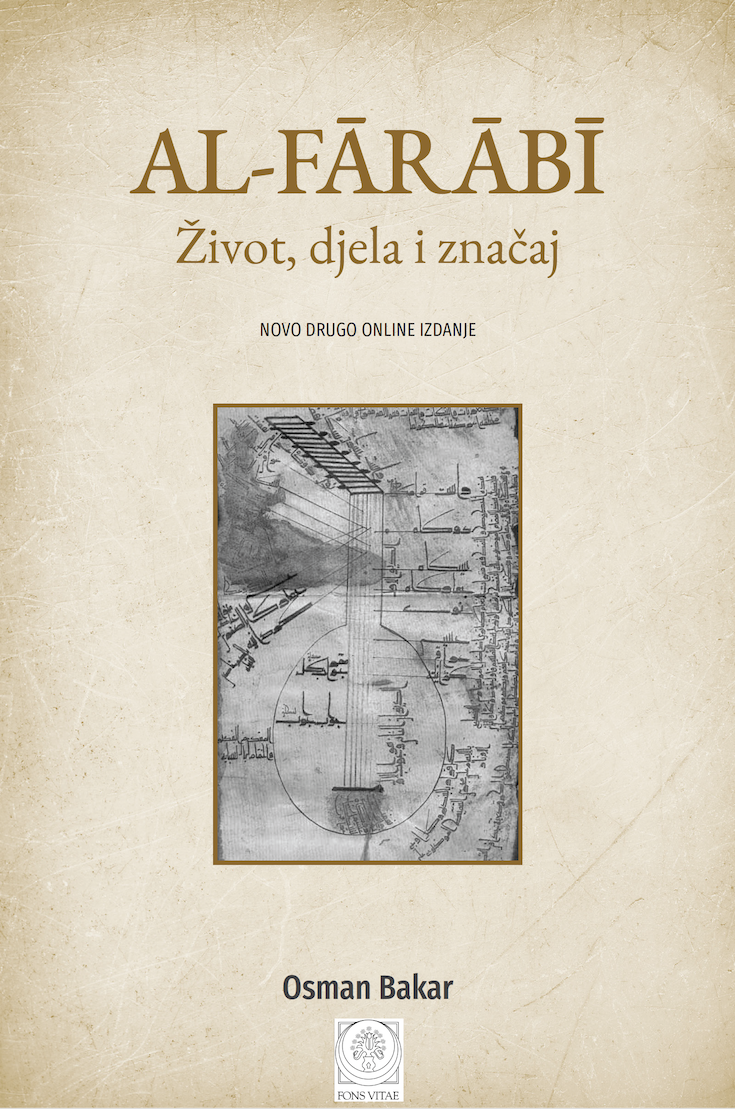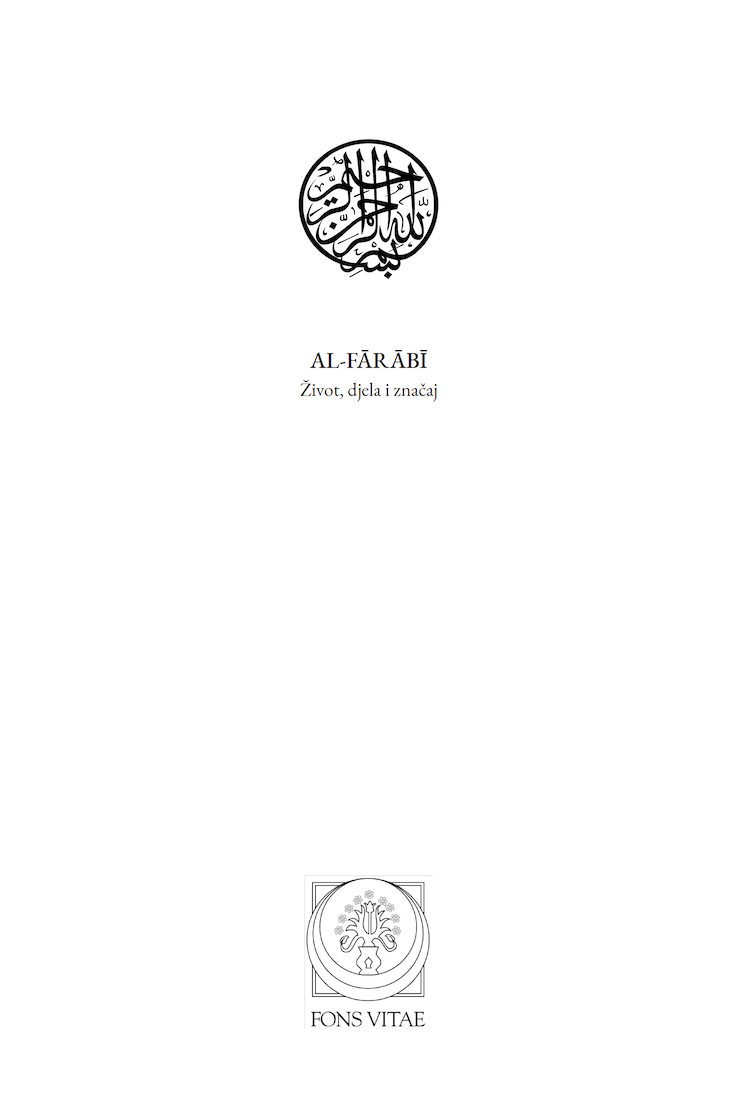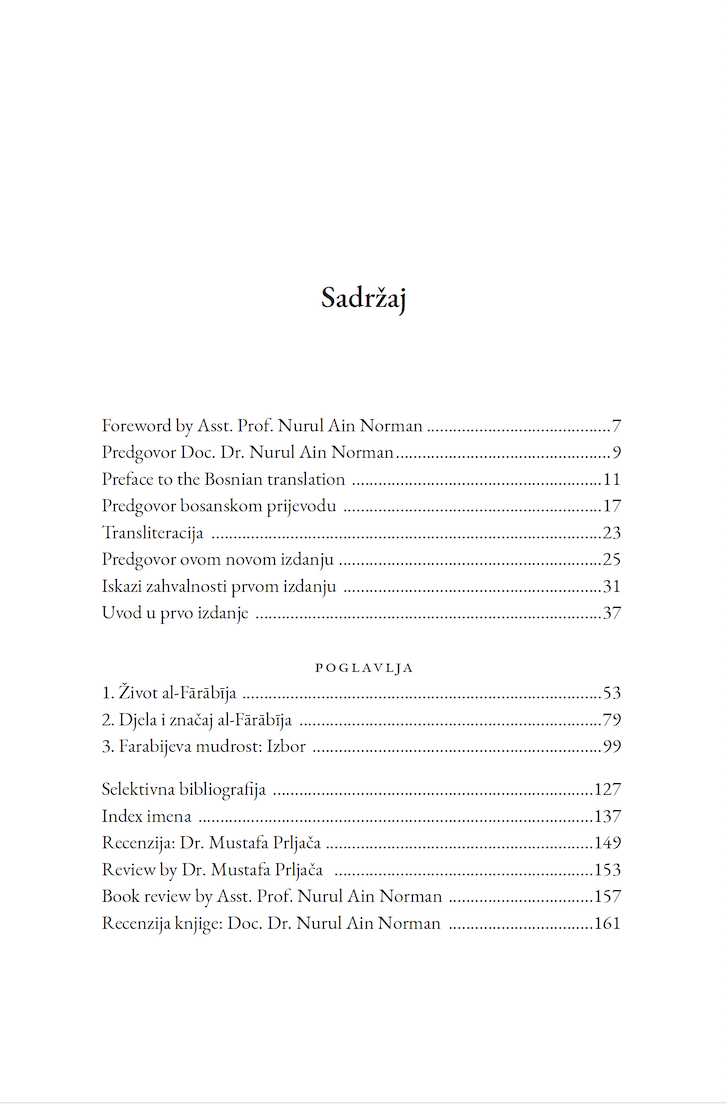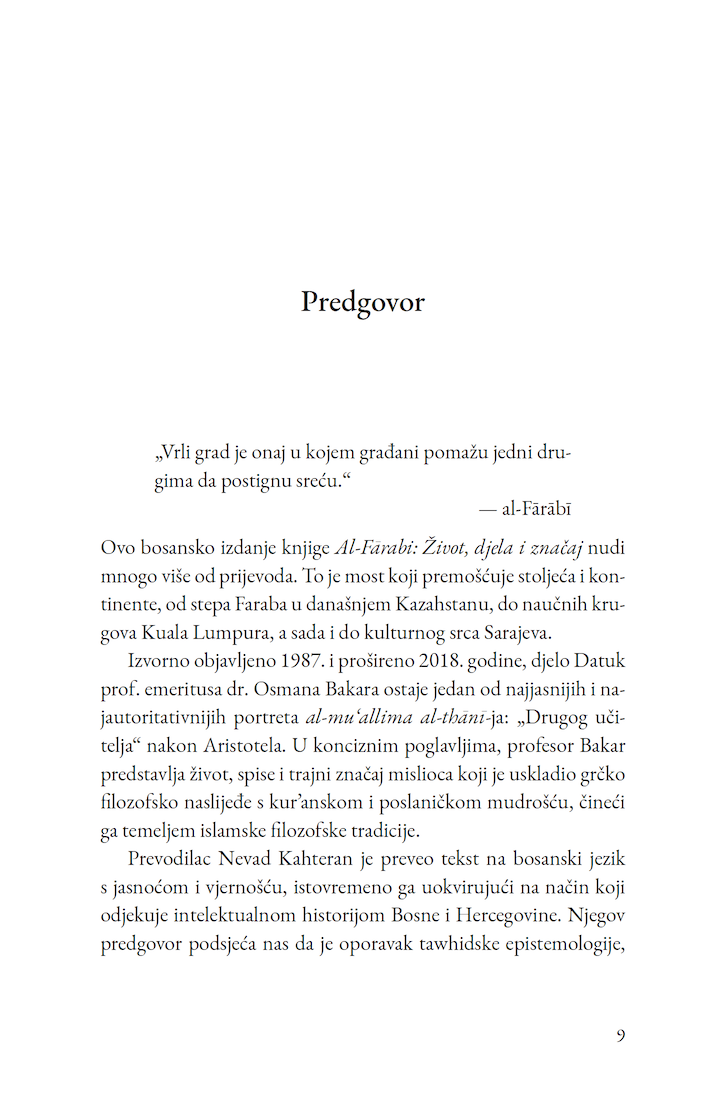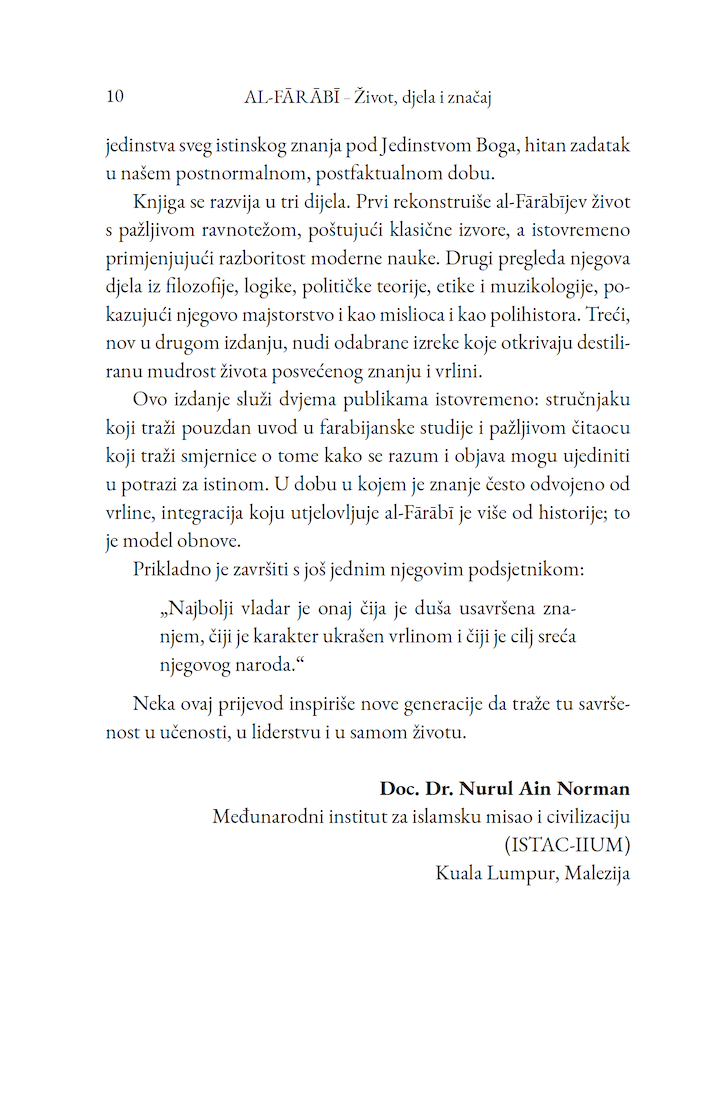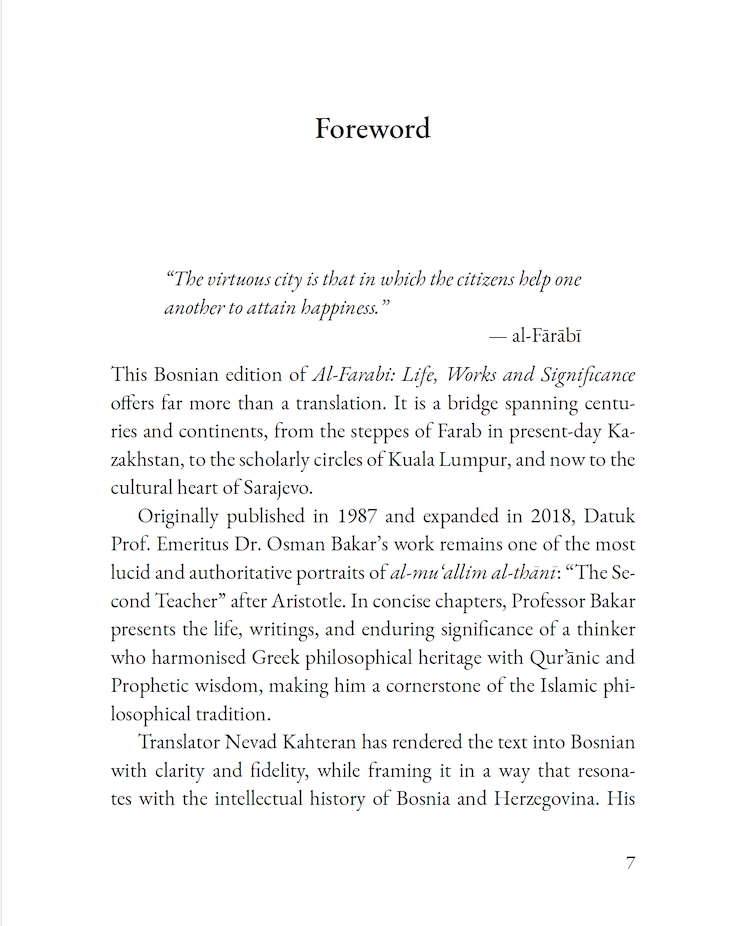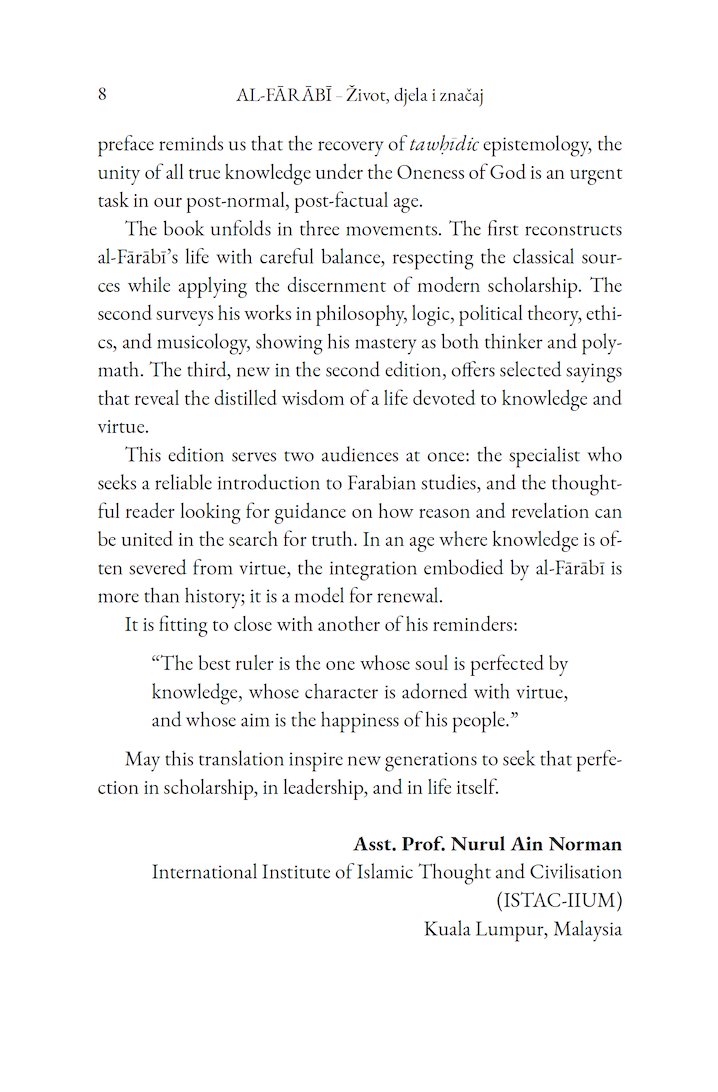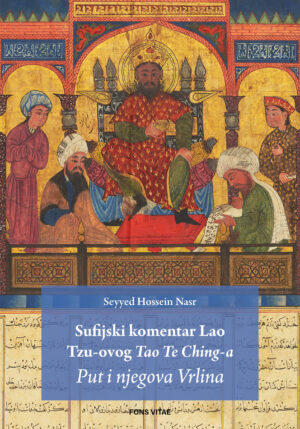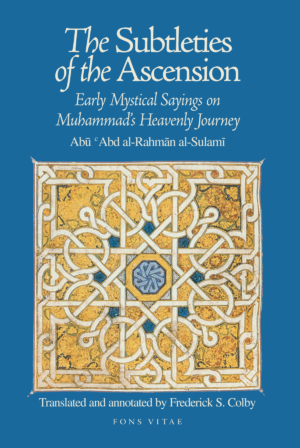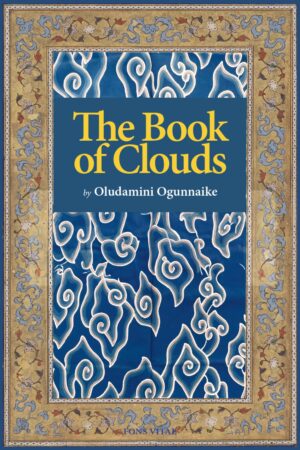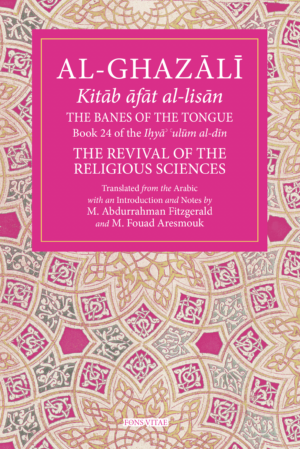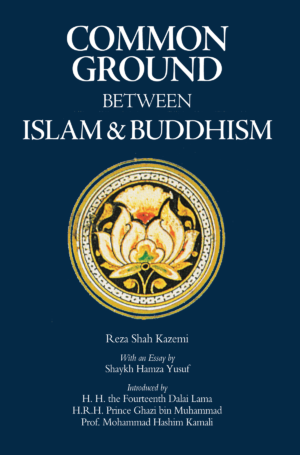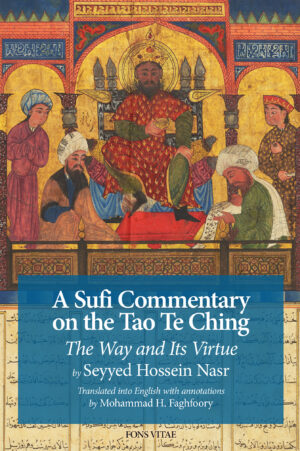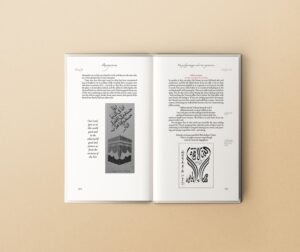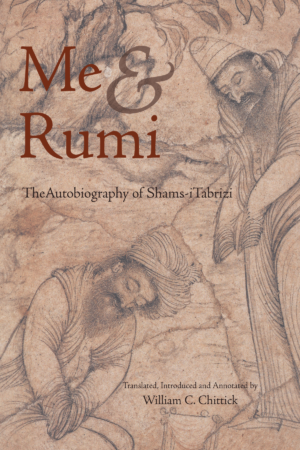Al-Fārābī: Život, djela i značaj – Osman Bakar (Bosnian Trans. Al-Fārābī: Life, Works and Significance )
Osman Bakar, Al-Fārābī: Život, djela i značaj. Drugo izdanje, Islamic Book Trust, Kuala Lumpur 2018; Bosanski prijevod Nevad Kahteran, online izdanje 2025.
Osman Bakar, Al-Fārābī: Life, Works and Significance. Second Edition, Islamic Book Trust, Kuala Lumpur 2018; Bosnian translation by Nevad Kahteran, online edition 2025.
DOWNLOAD Free here:
PDF Al-Fārābī: Život, djela i značaj – Osman Bakar
ePUB Al-Fārābī: Život, djela i značaj – Osman Bakar
Djelo malezijskog filozofa Osmana Bakara Al-Fārābī: Život, djela i značaj jedno je od vrlo jasnih i sažetih uvoda u opus Abū Naṣra al-Fārābīja (oko 870. – 950.), u islamskoj tradiciji poznatoga kao al-mu‘allim al-thānī – „Drugi učitelj“ nakon Aristotela. Knjiga, prvi put objavljena 1987., u proširenom obliku 2018. godine, a zatim u bosanskom prijevodu 2025., pruža sustavan pregled života, pisanog opusa i trajnog značenja ovoga ključnog mislioca islamske peripatetičke tradicije.
Knjiga je podijeljena u tri cjeline. Prvi dio donosi biografski prikaz al-Fārābījeva života, temeljen na klasičnim izvorima i suvremenoj historiografiji. Drugi dio nudi pregled njegovih glavnih djela i učenja, uključujući logiku, metafiziku, etiku, političku filozofiju i muzikologiju. Treći dio, dodan u drugom izdanju, sadrži izbor al-Fārābījevih mudrosti i izreka, čime se čitatelju omogućuje neposredan uvid u misaoni svijet samoga filozofa.
Autor posebno naglašava sintezu grčke filozofske baštine i islamskog objavnog horizonta. Al-Fārābī se prikazuje kao mislilac koji je, polazeći od Kur’ana i Sunneta, nastojao osmisliti intelektualni odgovor na helenističku filozofiju, provodeći njezinu „islamizaciju“. Njegov koncept Vrlinskoga grada (al-Madīna al-fāḍila) prikazan je kao spoj filozofskoga i proročkoga ideala, pri čemu vladar-filozof objedinjuje svjetovno i duhovno vodstvo.
Osobita pozornost posvećena je Farabijevu razumijevanju znanosti i klasifikaciji znanja (Iḥṣā’ al-ʿulūm), teoriji emanacije i hijerarhiji intelekata. Knjiga jasno pokazuje njegov utjecaj na kasnije islamske filozofe poput Ibn Sīnāe i Ibn Rušda te ističe njegovu ulogu u oblikovanju islamske epistemologije u duhu tevhida. Tekst je sažet, pregledan i pisan stilom koji spaja znanstvenu utemeljenost i esejističku čitljivost.
Bosanski prijevod Nevade Kahterana predstavlja značajan doprinos domaćojfilozofskoj i kulturnoj sredini. Prevoditelj je dosljedno primijenio standarde transliteracije arapskih termina (npr. ḥ, ṣ, ṭ), čime je osigurana preciznost i jasnoća. Ključni pojmovi preneseni su vjerodostojno: al-ʿaql al-faʿʿāl kao „Aktivni intelekt“, al-Muʿallim al-thānī kao „Drugi učitelj“, al-Madīna al-fāḍila kao „Vrlinski grad“. Termin saʿāda preveden je kao „sreća“, u smislu blaženstva kao konačnog dobra, što odgovara ustaljenoj terminologiji.
Prevoditelj je razlikovao falsafu (filozofiju u aristotelovsko-neoplatonističkoj tradiciji) i ḥikmu (mudrost), čime je očuvana nijansiranost islamskog misaonog horizonta. U pogledu stila, prijevod je fluidan i čitljiv, a popratni predgovori i bilješke dodatno smještaju tekst u kontekst intelektualne tradicije jezičnog podneblja. Ovim prijevodom čitateljstvu je dostupan sustavan prikaz posvećen al-Fārābīju, što otvara prostor za daljnja istraživanja i akademske rasprave.
Bakarova knjiga u ovom izdanju nudi preglednu sintezu života i misli „Drugog učitelja“ te istodobno služi kao most između antičke filozofije i islamske objave. Ona je vrijedna i za specijaliste (filozofe, orijentaliste, teologe) i za širu kulturnu javnost zainteresiranu za povijest ideja izvan zapadnog kanona.
Premda djelo ne uključuje raspravu o utjecaju na latinsku skolastičku tradiciju niti donosi najnovija istraživanja Zapadnih autora, njegova vrijednost ostaje u jasnoj i inspirativnoj sintezi al-Fārābījeva opusa. Prevoditeljski rad Nevade Kahterana omogućio je da ovo djelo dobije zasluženo mjesto u domaćem filozofskom i kulturnom kontekstu.
Knjiga Al-Fārābī: Život, djela i značaj u ovom prijevodu zaslužuje trajnu recepciju u humanističkim znanostima i može poslužiti kao polazište za nova istraživanja islamske filozofije i njezina mjesta u globalnoj intelektualnoj povijesti.
Željko Paša
Pontificio Istituto Orientale
Pontificia Università Gregoriana
Renowned Malaysian Scholar Continues Legacy of Al-Farabi Through His Best-Selling Book
Renowned Malaysian Scholar Continues Legacy of Al-Farabi Through His Best-Selling Book
- ePDF, ePUB
- 166
